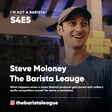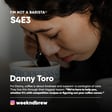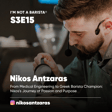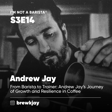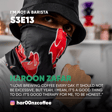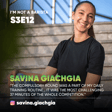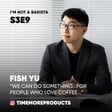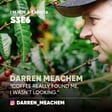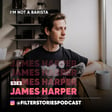Speaker
So yeah, I've been in this industry for almost four years now. I think that for me personally, I want to learn new things. So I want to keep coffee. I want to stay in coffee somehow, but I might not want to just focus on coffee in the future. In 10 years, I want to be, I don't know, could be working in line. I could be doing other things. Okay. How about becoming a boxer? Oh, yeah. Why not? I have always boxed. I started when I was really young. And that's what I always say. I'm like, okay, after coffee competitions, I'll probably do some Muay Thai matches and compete in that. But at the same time, I'm also getting older. So, like, I can't wait for too long. Maybe. Maybe if I don't compete for Barista Brewers Cup next year, I'll do a Muay Thai thai match all right let's switch the gears a bit how about we talk about something outside of coffee world for a change and if you don't do coffee anymore what else will you would you like to do there are too too many things i want to do um i love traveling i think I'm someone that cannot be put in one place for a very long amount of time. So I need a career that allows me to move around a lot. Either be, I don't know, anything's possible. Working in the export industry or maybe like bringing Warren Champagne to Hong Kong, an airline pilot. I don't know. For me, the world is huge. I'm open to doing anything else really. But I'm also very passionate about like tasting, smelling. Besides coffee, I'm also very into niche perfume. I'm into wine. So any niche industries like this could be something potentially that I'd be interested in. Yeah, you mentioned perfume. I don't know much about that industry. Maybe you can tell us more about that. Is this something similar to specialty coffee? So I didn't know this industry existed, niche perfumes, until I moved to France. And so I, because I also live in Paris, so there are a lot of small perfume shops where you can get high quality perfume made by like smaller perfumaries and it's kind of like specialty coffee but for perfume. So in the beginning when I smelled perfume I always thought okay you have the big brands of all these like you know French clothing brands, perfume brands or makeup brands and then you dive into like the niche industry and you realize wow it, it's like a whole new level. It's like specialty coffee, but like 90 plus. And it's really cool because you see the same people who are kind of like, I don't know how to put it, but I guess the people who are in niche perfume are like people who are doing like competitions in specialty coffee. Because they're trying to tell you, okay, this perfume is so complex. It smells like 50,000 things. It evolves. You have this note, middle note. You have these different enzymes or molecules. And then in coffee, you're like, yeah, this one is like a panamagasia, neuro anaerobic fermentation, whatever, 1,900 meters above sea level. And in perfume, you have the exact same thing. That's really fascinating. As a regular consumer, you won't know that. When you go to Sephora, you go to get a little less like this. That's not what you get. Kind of like when you go its own to, I don't know. world Has of experts who dive in really deep into the very tiny details. It's almost like there is a hidden language or a layer of understanding for only reviews that is solved once you're fully immersed in it. And for most people, they don't get the experience that when they are picking up a product at the store, whether it's a coffee at a supermarket or perfume, it seems that you really have to enter that world to appreciate everything that goes into it. And how about boxing? I mean, we got a connection with coffee and perfume, wine. That makes sense, right? But multi-boxing, that's not something that we usually hear about from a coffee people barista or outside thailand so how did you get into that yeah i think how did i get into boxing so i'm a very like i'm someone that has quite a lot of energy, I think. And I need to release my stress and my energy somehow. Okay. And boxing was something I started when I was 14. And ever since my first class, I just loved it. Like, how I felt after my class, like, you release so much energy and so much about cardio and it's so much about like using your different muscles as well. And you learn so much about like discipline and about yourself as well. And yeah, I don't know. It kind of just calms me down. I'm not that good. I mean, I'm not that good. I used to be better when I trained a lot. Right, I'm like pretty rusty because it's been a long time. I haven't practiced like on a regular basis. But yeah, there were periods where I was supposed to compete. I just didn't. It sounds like you're naturally drawn to competitions, whether it's coffee or boxing. You've accomplished a lot, actually, just in four or five years in coffee world. To many people, that may not seem to be very long, but your result, your achievements definitely is very impressive. And do you have any advices for those who are just starting out like new baristas who want to grow in the coffee industry? Hi, Nian there. I think if you're doing what you love, if you're doing what you care about, what you think represents you as a brand, it's a matter of time as well. You need patience. Doing competition is definitely something that could help. If you want a change in environment, if you want to meet more people, if you want to challenge yourself, why not try a competition? I think in the beginning, I didn't think this is something I would like. But then after your first competition, you kind of get addicted. Yeah, just keep going. It's so cliche to say, but don't give up because one day you'll get there. Yeah, thank you. Those are good tips. But I also got this feeling that not everybody finds it easy to stay in the coffee industry for a longer time. That can be really challenging, you know, like low salaries for baristas and tough situation for farmers that might push some people to leave. So here's a bit of an unusual question for you. In your opinion, what kind of people may not be a good fit for the coffee world? This is maybe a little selfish to say, but I think for me, people who don't really care about the product itself or people who don't really care about, yeah, where the coffee's coming from, who is working behind it, what does it taste like. If people are just taking the business approach or if people just want to get into coffee to make money, I think that's maybe not the industry for you because coffee is a very passion-oriented industry. You have to really like it or love it even to do something substantial, I think, in this industry and to also stay in this industry, it's a lot of hard work like any other smaller industries in hospitality or food and beverage. It's really tough. So if you're not ready for the hard work and if you're not passionate enough, maybe some other industry would be more suited to you. Right. That makes sense. The coffee industry has been growing really, really fast in the recent years, and especially when the other industry in comparison kind of slowed down. With all the interest in investment, it's understandable that a lot of people and businesses are drawn into the coffee industry, which is, well, makes sense. I actually just remember that some of the coffee trend or social media trend a while back saying that paying more for your coffee as a way to support farmers directly. As a roaster and business owner, what is your take on that? Does it really make sense and actually make a difference? Pay more for your coffee to help your farmers. How? I don't know. Okay. Because I'm also a barista. I'm behind the bar, so I get to meet a lot of my clients and sometimes some clients that are not used to paying a little bit more for specialty coffee. My biggest challenge is always justifying, or for me, I shouldn't have to justify the price, but because it's not what they're used to, I always have to explain to them why we are a little bit more expensive than regular coffee shops that don't do specialty coffee. I think it's marketing. I think most people who are willing to pay for specialty coffee are also people who care a lot about taste. It's kind of like wine. Some bottles are worth a lot of money. And the people that buy these bottles are maybe not the people who will dig into everything about this producer. How does he make it? It's worth more because it tastes better. So I think as a consumer, not everyone is willing to do charity every day. You know, it's like, oh, I want to help the producer. I want to help this person. I'm going to pay more. I think as a consumer, people are trying to lower costs and especially the economy is not doing super well nowadays. They just want their caffeine dose a lot of the time. If there are three coffee shops and they all do the same kind of quality coffee, same service, then they probably will go to the cheaper one. I don't know. I hope that this would work. For me, it would also be nice to help some producers. There are definitely some producers who are smaller that struggle more with making enough money from their coffees. But I also think as a consumer, consumers need also to stay educated to understand the cost of what they're actually consuming. Have you had the chance to visit any coffee origins? What was that experience like for you?

